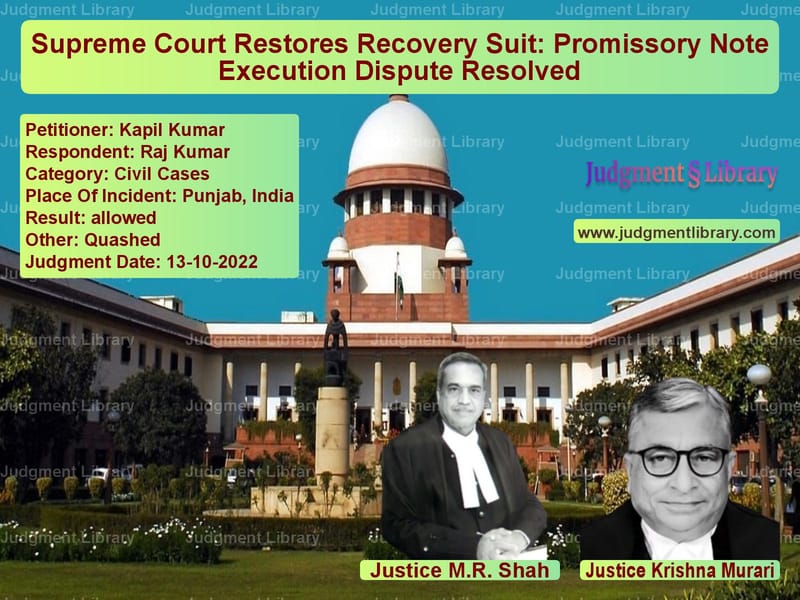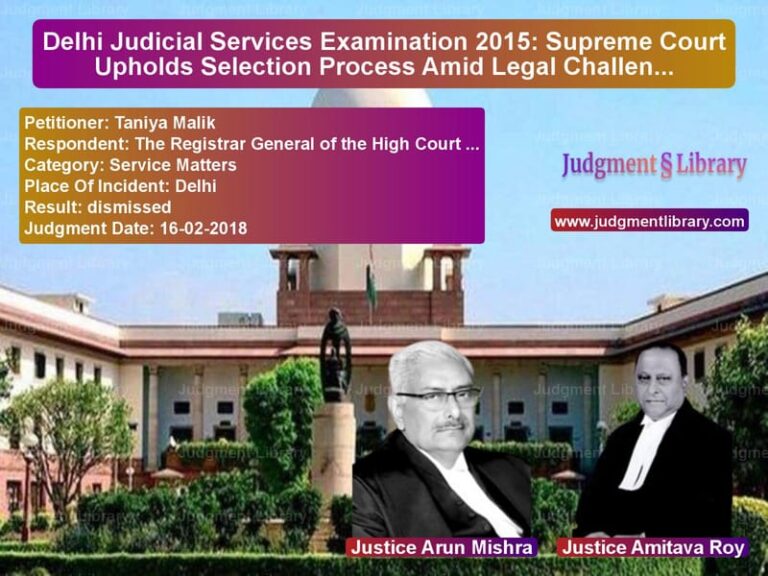Supreme Court Restores Recovery Suit: Promissory Note Execution Dispute Resolved
The Supreme Court of India recently decided a significant case concerning a monetary dispute based on a promissory note in Kapil Kumar vs. Raj Kumar. The case revolved around whether the execution of a promissory note was proven and whether the lower courts correctly ruled on the recovery suit filed by the plaintiff.
Background of the Case
Kapil Kumar, the plaintiff, filed a suit against Raj Kumar, the defendant, seeking recovery of Rs. 1,36,550. The plaintiff alleged that the defendant had borrowed Rs. 1 lakh on June 29, 2007, and had executed a promissory note as evidence of the loan. However, the defendant denied the execution of the promissory note, claiming that he had not borrowed money from the plaintiff but had instead settled a past transaction with the plaintiff’s father.
The Trial Court and the First Appellate Court both ruled in favor of the plaintiff, holding that the execution of the promissory note was proven. However, the Punjab and Haryana High Court overturned these findings, stating that the plaintiff had failed to prove the promissory note’s execution due to the non-examination of an attesting witness.
Arguments by the Petitioner (Kapil Kumar)
The petitioner argued:
- The Trial Court and First Appellate Court had correctly ruled in his favor, as the promissory note was sufficiently proven through the testimony of a handwriting expert and other supporting evidence.
- The High Court erred by interfering with concurrent findings of fact, which were based on proper appreciation of evidence.
- The deed writer, who was examined as PW3, confirmed that the defendant acknowledged receiving the money, thereby proving the execution of the promissory note.
- The plaintiff had also produced a handwriting expert (PW2) who confirmed that the defendant’s signature on the promissory note was genuine.
Arguments by the Respondent (Raj Kumar)
The respondent contended:
- The plaintiff failed to examine an attesting witness to the promissory note, making its execution unproven.
- The alleged loan transaction was between the defendant and the plaintiff’s father, not the plaintiff himself.
- The presumption under Section 118 of the Negotiable Instruments Act, which assumes consideration for negotiable instruments, did not apply as the execution was not properly established.
Supreme Court’s Observations
The Supreme Court analyzed the evidence and legal precedents and made the following key observations:
- The High Court wrongly interfered with concurrent findings of fact recorded by the Trial Court and First Appellate Court.
- The promissory note’s execution was sufficiently proven through the testimony of PW3 (deed writer) and PW2 (handwriting expert).
- The defendant failed to provide any evidence to contradict the findings of the lower courts.
- Minor contradictions in witness testimonies did not affect the validity of the promissory note.
- Presumption under Section 118 of the Negotiable Instruments Act applied, as the execution was not effectively rebutted.
Final Judgment
The Supreme Court set aside the High Court’s ruling and reinstated the Trial Court and First Appellate Court’s judgment in favor of the plaintiff. The Court held:
“The findings recorded by the Trial Court and First Appellate Court on execution of the promissory note were based on proper appreciation of evidence. The High Court’s interference was unwarranted.”
The Court also reaffirmed that once the execution of a promissory note is established, the burden shifts to the defendant to prove that no consideration was given.
Implications of the Judgment
The ruling has significant implications for recovery suits based on promissory notes:
- Courts should not interfere with concurrent factual findings unless there is a clear legal error.
- Presumptions under the Negotiable Instruments Act favor the holder of a promissory note unless effectively rebutted.
- Handwriting experts and deed writers’ testimonies are crucial in proving execution when an attesting witness is unavailable.
- The burden of proof shifts to the defendant once the execution of a promissory note is established.
This ruling reinforces the importance of documentary evidence in loan transactions and protects the rights of creditors seeking recovery based on legally executed instruments.
Petitioner Name: Kapil Kumar.Respondent Name: Raj Kumar.Judgment By: Justice M.R. Shah, Justice Krishna Murari.Place Of Incident: Punjab, India.Judgment Date: 13-10-2022.
Don’t miss out on the full details! Download the complete judgment in PDF format below and gain valuable insights instantly!
Download Judgment: kapil-kumar-vs-raj-kumar-supreme-court-of-india-judgment-dated-13-10-2022.pdf
Directly Download Judgment: Directly download this Judgment
See all petitions in Contract Disputes
See all petitions in Debt Recovery
See all petitions in Specific Performance
See all petitions in Damages and Compensation
See all petitions in Judgment by Mukeshkumar Rasikbhai Shah
See all petitions in Judgment by Krishna Murari
See all petitions in allowed
See all petitions in Quashed
See all petitions in supreme court of India judgments October 2022
See all petitions in 2022 judgments
See all posts in Civil Cases Category
See all allowed petitions in Civil Cases Category
See all Dismissed petitions in Civil Cases Category
See all partially allowed petitions in Civil Cases Category






